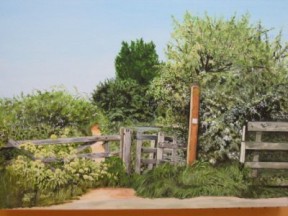One midnight in the Konkan, I found myself precariously near the edge of a straight, steep drop down a valley. Timely brakes, controlled clutch and a broken wall. Not entirely broken. A storm raining over it, and so many crumbling rocks and yet it was not yet a non-wall.
But I was too close to the edge and was afraid. To me, it looked broken, dug out by the storm. Suddenly I thought how this was less like a wall and more like a ‘ha-ha.’
A ha-ha is also a laugh, and so, I smiled. But being so close to the edge was no laughing matter, and yet a laugh is sometimes the best defence against fear.
But back to ‘ha-ha.’ Where did the word come from? The only time I came across this word was in Jane Austen’s, Mansfield Park. Once, back home I find Jane Austen’s book and directly go to ‘Notes.’ Pg 73. Ha-ha -‘A fence carefully constructed so that it would not spoil the view.’
Possibly so named because of the exclamation of surprise when unexpectedly coming across it- ‘ha-ha!’ A wall invisible to others.
That one at the edge of the hill? It was a kind of a fence too but not ‘carefully constructed.’
It was the beginning of destruction, as I was soon to find out.
The journey back home next day had not been very easy either. Policemen and a few volunteers were stopping vehicles at the edge of Pune and instructing travellers to not go through Amboli, and take the Phonda Ghat instead.
“Darad kosalli,” they said, “There was a landslide.” There was. Last night, near the 20 kms milestone. The 20 kms milestone visible to my headlights while my car had struggled not to slide down the valley.The land though must have slid just after I left the place.
But now to pg 73 and to Fanny who is content to look at the verdure over the ha-ha and Mary Crawford whom resting ‘fatigues’ but she has to keep moving.
Naturally, it is to the lively Miss Crawford that our man Edmund Bertram is attracted. The scene ends with the couple planning the rest of the walk. Fanny was rested, and would have moved too, “but this was not suffered. Edmund urged her to remain where she was, with an earnestness which she could not resist, and she was left on the bench. She watched them till they had turned the corner and listened till all sound of them had ceased.”
Silly girl, this passive protagonist of Mansfield Park. “Get up and take another path. Walk away Fanny Price!” I have always screamed at her. “Give her some spine!” I have told Jane Austen many times.
Today however, I find myself starting to read the book again. Novels I now realise are so much more than just the story. They have words. They have thoughts, and feelings which come from the deepest part of the writer’s mind and then linger on somewhere inside our head.
That night, a word made me smile and helped me collect my nerves enough to know that I had to turn back from the edge of a precipice. Just one word. Isn’t this a sign of fine, enduring writing? It was almost five years since I last read Mansfield Park, and yet I recollected a word from it when I was lost.
A word that was sent to me from a novel written 197 years ago.
Nadi (Dr. Manasee Palshikar) was an MBBS doctor for 10 years when she went back to studying. A course in Women’s Studies at Pune University was followed by learning the art of Screenplay at FTII. Nadi lives in Pune with her husband and daughter.







“Novels I now realise are so much more than just the story…”
yes they are…
“…they have thoughts, and feelings which come from the deepest part of the writer’s mind and then linger on somewhere inside our head.” yes they do…
O u have outdone yourself…u were born to write…I hear publication bells!
not to mention this draws inspiration from my all time favourite author…
:))
Nice write-up Nadi.